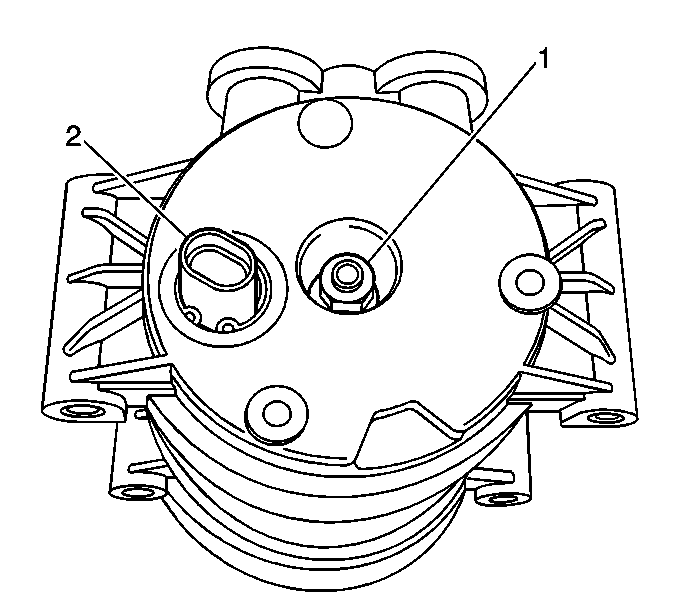For 1990-2009 cars only
Removal Procedure
Tools Required
| • | J 5403 Snap Ring Pliers |
| • | J 9553-01 O-Ring Remover |
- Recover the refrigerant the system. Refer to Refrigerant Recovery and Recharging in Heating, Ventilation and Air Conditioning.
- Clean the control A/C compressor high pressure cut-off switch area before removing the snap ring.
- Disconnect the electrical connector from the A/C compressor high pressure cut-off switch (2) in the rear head of the compressor.
- Remove the A/C compressor high pressure cut-off switch snap ring using a pair of 90 degree angle pliers or refer to J 5403 .
- Remove the A/C compressor high pressure cut-off switch (2) from the compressor.
- Remove the old O-ring seal from the A/C compressor high pressure cut-off switch cavity using the J 9553-01 .
- Inspect the A/C compressor high pressure cut-off switch cavity and the O-ring groove in the rear head for dirt or foreign material. Clean the components as necessary.

Installation Procedure
- Lubricate the new O-ring using new 525 viscosity refrigerant oil.
- Install the new O-ring into the groove in the switch cavity.
- Lubricate the control switch housing using new 525 viscosity refrigerant oil.
- Install the switch (2) into the switch cavity until the switch bottoms in the cavity.
- Install the A/C compressor high pressure cut-off switch snap ring using a pair of 90 degree angle pliers or refer to J 5403 . Ensure that the high point of the curved sides is adjacent to the switch housing. Ensure that the snap ring is properly seated in the switch cavity retaining groove.
- Evacuate and recharge the system. Refer to Refrigerant Recovery and Recharging in Heating, Ventilation and Air Conditioning.
- Ensure that no leaks exist in the system. Refer to Leak Testing in Heating, Ventilation and Air Conditioning.

Important: If you reinstall an existing control switch in the compressor, use a new O-ring and a new retainer ring. An O-ring and a retainer ring is included in a new switch kit.
